|
|
|
Sort Order |
|
|
|
Items / Page
|
|
|
|
|
|
|
| Srl | Item |
| 1 |
ID:
168650
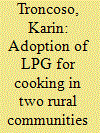

|
|
|
|
|
| Summary/Abstract |
In 2011, a government initiative provided Liquefied Petroleum Gas (LPG) stoves and cylinders to almost 1000 rural families in Chiapas, Mexico. In 2017, the Pan-American Health Organization (PAHO) conducted an evaluation of cooking practices among the beneficiaries of these stoves.
|
|
|
|
|
|
|
|
|
|
|
|
|
|
|
|
| 2 |
ID:
132634
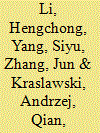

|
|
|
|
|
| Publication |
2014.
|
| Summary/Abstract |
To alleviate the problem of the insufficient reserves of natural gas in China, coal-based synthetic natural gas (SNG) is considered to be a promising option as a source of clean energy, especially for urban use. However, recent study showed that SNG will not accomplish the task of simultaneous energy conservation and CO2 reduction. In this paper, life cycle costing is made for SNG use in three main applications in residential sector: heating, household use, and public transport. Comparisons are conducted between SNG and coal, natural gas, liquefied petroleum gas (LPG), diesel, and methanol. The results show that SNG is a competitive option only for household use. The use of SNG for heating boilers or city buses is not as cost-effective as expected. The biggest shortcoming of SNG is the large amount of pollutants generated in the production stage. At the moment, the use of SNG is promoted by the government. However, as shown in this paper, one can expect a transfer of pollution from the urban areas to the regions where SNG is produced. Therefore, it is suggested that well-balanced set of environmental damage-compensating policies should be introduced to compensate the environmental losses in the SNG-producing regions.
|
|
|
|
|
|
|
|
|
|
|
|
|
|
|
|
| 3 |
ID:
168658
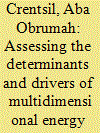

|
|
|
|
|
| Summary/Abstract |
Improving household access and use of clean energy has been central to global development efforts in recent years. The negative effects of energy poverty on health, climate, livelihoods and economy has led to increased investments towards achieving universal access to clean energy. However, significant deprivations in clean energy remains, especially in developing countries. Energy poverty may involve simultaneous deprivations on availability and affordability of clean energy. Using repeated cross-sectional data, this paper assesses the extent and determinants of multidimensional energy poverty in Ghana between 2008 and 2014. The paper finds that though the level of multidimensional energy poverty reduced in Ghana between 2008 and 2014, the incidence and intensity of multidimensional energy poverty remains high. Further, we find substantial subgroup differences in multidimensional energy poverty. The results reveal significant relationships between household characteristics and the multidimensional energy poverty status of households. The reductions in multidimensional energy poverty were driven by the coefficient effects attributable to structural and policy changes over the period. To facilitate universal access to clean energy and reduce the degree of multidimensional energy poverty, there is the need to intensify the LPG promotion campaign and adopt strategies that target left-behind and underserved groups.
|
|
|
|
|
|
|
|
|
|
|
|
|
|
|
|
| 4 |
ID:
105573


|
|
|
| 5 |
ID:
130635
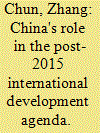

|
|
|
|
|
| Publication |
2014.
|
| Summary/Abstract |
The deadline for the UN's Millennium Development Goals (MDGs) is 2015 and the
international debate on post-2015 development goals has already begun. Currently, there
are three aspects to this debate that are not favorable to China and other developing
countries. Because China has not been paying enough attention to this, it should now
work to engage other nations in this debate and encourage a post-2015 agenda with the
core objectives of poverty reduction and sustainable development.
|
|
|
|
|
|
|
|
|
|
|
|
|
|
|
|
| 6 |
ID:
095394
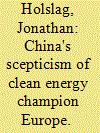

|
|
|
|
|
| Publication |
2010.
|
| Summary/Abstract |
While the EU has sought to gain both profit and "soft power" from increased cooperation with China in the field of clean energy, not much of this expectation has materialised. China is unwilling to recognise the European Union as the world's clean energy champion, and is itself trying to secure a larger part of the international market through green power. In this highly competitive sector, Europe should give up its soft power aspiration and should resort to a realist but constructive policy. On the one hand, it should impose more ambitious curbs on its emissions and use this as an incentive to boost its own green technologies. On the other hand, it should develop a two-track approach for its international cooperation: limited aid-based synergies with the least developed countries alongside pragmatic economic bartering with all emerging countries, not just China.
|
|
|
|
|
|
|
|
|
|
|
|
|
|
|
|
| 7 |
ID:
058149
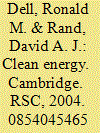

|
|
|
|
|
| Publication |
Cambridge, RSC, 2004.
|
| Description |
xxxvi, 323p.
|
| Series |
RSC clean technology monographs
|
| Standard Number |
0854045465
|
|
|
|
|
|
|
|
|
|
|
|
Copies: C:1/I:0,R:0,Q:0
Circulation
| Accession# | Call# | Current Location | Status | Policy | Location |
| 049008 | 333.79/DEL 049008 | Main | On Shelf | General | |
|
|
|
|
| 8 |
ID:
118109
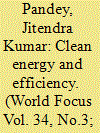

|
|
|
| 9 |
ID:
186435


|
|
|
|
|
| Summary/Abstract |
Despite of the promising benefits of modern and clean cooking energies, its adoption has been extraordinarily low in Tanzania principally owing to preferences for Dirty and Clean Energy Mixes (DCEMs) over Clean Energy Mixes (CEMs). This study examines this energy stacking behavior based on a 2018 survey dataset of 245 useable responses from Kigamboni district in Dar es Salaam Tanzania. It is notable that the energy transition is from Single Dirty Energy (SDE) or Dirty Energy Mixes (DEMs) towards CEMs via Single Clean Energy (SCE) i.e. LPG with DCEMs in both its lower and upper sides. This approach tends to lengthen the path of transition because CEMs for cooking purposes is only affordable to the minority very high SES class. As a result the majority poor are pushed into the dirty energy “trap” despite of the booming LPG market. Although LPG support initiatives can eliminate dirty non-commercial energies, such initiatives cannot solely be relied upon to reducing the domestic consumption of dirty commercial energies even at high SES. Policy options are two way; either to alleviate SES to the level that quicken the transition or adopt wider electrification alongside appliance subsidies or microfinance to enhance CEMs affordability.
|
|
|
|
|
|
|
|
|
|
|
|
|
|
|
|
| 10 |
ID:
104869
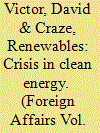

|
|
|
| 11 |
ID:
186495
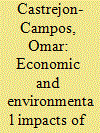

|
|
|
|
|
| Summary/Abstract |
Learning curve theory has been adopted for investigating the relationship between technological learning and technology cost developments. The aim of this paper is to explore the impacts of public investment in clean energy research, development, and demonstration (RD&D) on future technology cost developments by using a two-factor learning curve approach. Learning-by-deploying and learning-by-researching were chosen as the main sources of learning. The focus is on onshore wind and solar photovoltaics in the United States of America. By using publicly available data, we estimated learning-by-deploying rates of 31.4% and 27.6%; and learning-by-researching rates of 2.3% and 4.7% for onshore wind and solar PV, respectively. By adopting a logistic curve approach, an additional $1322 and $819 mil. were forecast to be spent by 2050 in RD&D for onshore wind and solar PV, respectively. We explored the plausible long-term effects of diverse RD&D investment scenarios on electricity generation and greenhouse gas (GHG) emissions using a system dynamics model. The findings reveal that public investment in RD&D for clean energy technologies may play a key role in the pace of capital cost reductions and technology diffusion. However, relatively little long-term effects of RD&D efforts alone were found on market dynamics and GHG emissions.
|
|
|
|
|
|
|
|
|
|
|
|
|
|
|
|
| 12 |
ID:
190217


|
|
|
|
|
| Summary/Abstract |
While many have observed a regime complex for global clean energy governance, research has not yet accorded sufficient attention to the interplay of multiple streams of politics that have led to the structuring of overlapping governance initiatives and, ultimately, the articulation of a set of norms that hold this regime complex together. To understand these dynamics, this article argues that with the visibly increased agency of transnational actors and international organizations, four mechanisms together are likely to shape regime complexity: divergent state preferences, the agency of transnational actors, practices of intergovernmental organizations, and interorganizational recognition and normative legitimation. Drawing on a qualitative analysis of policy documents and interviews, and a social network analysis, it studies global clean energy governance from 1980 to 2014 to illuminate these dynamics. The findings suggest that the combination of these four mechanisms can explain the evolution from a nonregime to a loosely coupled governance system for clean energy.
|
|
|
|
|
|
|
|
|
|
|
|
|
|
|
|
| 13 |
ID:
179735
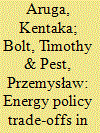

|
|
|
|
|
| Summary/Abstract |
This study applied a discrete choice experiment using best-worst scaling questions (multi-profile, BWS case 3) to estimate the trade-offs which a sample of the Polish population is willing to make for energy reform regarding carbon reduction. Attributes considered in the study are CO2 emissions reduction, National energy independence, Employment impact, Time needed for policy transition, and Impact on household energy prices. Respondents (n = 639) choose the best and worst of the presented policy options to fit a rank-ordered logit model. This study reveals concern about climate change among respondents, but that they prioritize energy prices and employment in their choice of preferred energy policy with significant variation across groups. A key distinction is revealed in the preferences by age cohort in which youngest (<25years old) respondents had the strongest WTP coefficients, particularly for CO2 and time to transition. Stronger and more urgent desires for CO2 reduction policies were also identified among the decisions of female respondents, those having more education, those without children, and middle and upper income groups. The respondents’ choices also revealed consistent loss aversion in all attributes presented in the choice experiment.
|
|
|
|
|
|
|
|
|
|
|
|
|
|
|
|
| 14 |
ID:
192143
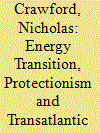

|
|
|
|
|
| Summary/Abstract |
US President Joe Biden has worked to repair the damage done to the transatlantic relationship by his predecessor, quickly realigning the United States with Europe on issues of energy and climate change. However, the US Inflation Reduction Act (IRA) of 2022 introduced a raft of protectionist subsidies for US clean-energy industries and reignited tensions between the US and the European Union. The EU has warned that the IRA could damage the bloc’s industry and American critics suggest the act may trigger a new US–EU trade war. The Biden administration’s geopolitical internationalism is at odds with its geo-economic nationalism. The fact remains, however, that Europe is unlikely to be severely affected by the IRA. Moreover, European political leaders have threatened more aggressive responses to the IRA than they can deliver. A trade war is unlikely. It is more likely that booming green industries in the EU and US will open new avenues to cooperation between them.
|
|
|
|
|
|
|
|
|
|
|
|
|
|
|
|
| 15 |
ID:
176872
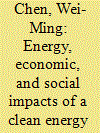

|
|
|
|
|
| Summary/Abstract |
Clean energy-related economic policy is designed to promote new energy technology and vigorous economic development. However, this type of policy is typically implemented and evaluated separately in the economic and energy sectors: comprehensive assessments are rarely done. This study analyzes the policy effectiveness of a clean energy-related economic policy in Delaware from energy, economic, and social perspectives.
|
|
|
|
|
|
|
|
|
|
|
|
|
|
|
|
| 16 |
ID:
099650
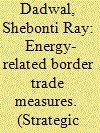

|
|
|
|
|
| Publication |
2010.
|
| Summary/Abstract |
Following the recent economic crisis, concerns over the revival of trade protectionism have surfaced, with some countries imposing or threatening to impose highly trade-distorting legislation to help their domestic industries compete in world markets, raising the spectre of a potential trade war. This paper looks at the attempts by some of the developed countries to introduce trade measures using the issue of climate change as a Trojan horse, to ensure that they do not lose out to the emerging economies. It also looks at the proposed legislations, and whether they are in conflict with international trade laws.
|
|
|
|
|
|
|
|
|
|
|
|
|
|
|
|
| 17 |
ID:
127523
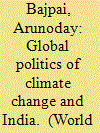

|
|
|
| 18 |
ID:
166315
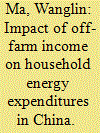

|
|
|
|
|
| Summary/Abstract |
This study examines the impact of off-farm income on rural household energy expenditures, paying special attention to clean energies such as electricity and gas and non-clean energy such as coal. We use instrumental variable approaches to address the endogeneity issues of off-farm income and analyze household survey data collected from rural Gansu, Henan and Shandong provinces of China. Econometric results show that off-farm income promotes rural energy transition. In particular, off-farm income significantly increases both electricity and gas expenditures but decreases coal expenditure of rural households. Further analyses reveal that the energy transition effects generated by off-farm income are more pronounced for households in Shandong where the economy is relatively better developed relative to Henan and Gansu. Our findings highlight the importance of income diversification through off-farm activities by farm households to enhance clean energy accessibility and boost sustainable rural economic development.
|
|
|
|
|
|
|
|
|
|
|
|
|
|
|
|
| 19 |
ID:
116028


|
|
|
| 20 |
ID:
135485
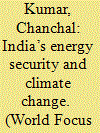

|
|
|
|
|
| Summary/Abstract |
India has multiple reasons for responding to climate change – it is highly vulnerable to the impacts of climate change, it is becoming more and more dependent on imported fossil fuels and it has the ability to take advantage of the economic opportunities and climate finance that is now available. It also places high importance on preserving ecosystems and its unique biodiversity.
|
|
|
|
|
|
|
|
|
|
|
|
|
|
|
|
|
|
|
|
|